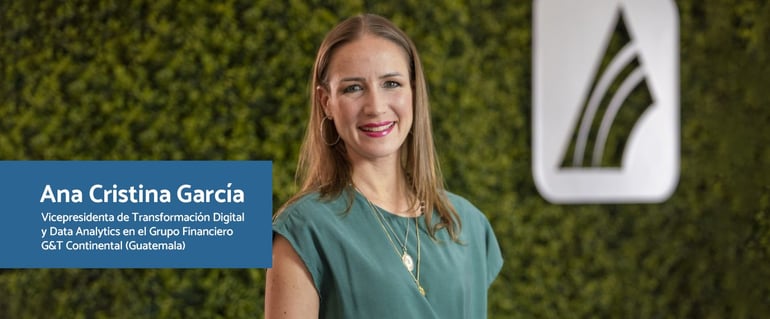 2 min.
read
2 min.
read

From Infocorp, we decided to interview different women who lead the change and inspire in the organizations where they work. Below you will find the experience of Ana Cristina García.
Flexibility and teamwork are among Ana Cristina's most outstanding characteristics, who today is Vice President of Digital Transformation and Data Analytics at the G&T Continental Financial Group, in Guatemala. She was trained at Babson College in Boston and then obtained a Master's degree in investment at Columbia Business School. She always knew that she would return to her country to develop her career.
IC: You trained abroad and then returned home: why?
AC: I wanted to bring a real change, to contribute to the growth of my country. That's why I came back after my Master's degree in New York. The culture in Guatemala is very sexist, people have a very particular mindset: women stay at home with the children. In fact, a lot of my friends don't work. But in my house it was different, for my dad it didn't matter if I was a man or woman, I had to work. Also, over the years I got divorced and felt it was my responsibility to get ahead: I am responsible for my life.
IC: What is the history of the bank and how many employees does it have?
AC: It is a very traditional bank in Guatemala. It is the third largest bank, although for a long time it was the second one. It has a lot of tradition; it is the bank that our grandparents used. Today we serve the general public, and we are very strong in corporate and companies. We are growing in retail banking. Today the bank has 5,000 employees and about 180 branches. We also have insurance: Seguros G&T is the second largest insurer in Guatemala, and it has another 1000 employees.
IC: How did the pandemic impact the bank's digital transformation?
AC: Actually, in the pre-Covid era we were already developing a very digital strategy. But in 2020, we carried out a consultancy and it was decided to accelerate that process to be able to grow without having to spend on more branches and to be able to assist our customers in a customized and efficient way. It was then that the vice presidency that I lead, of digital transformation, and the area of data analytics was created. I'm responsible for both areas. Transactions in digital channels have grown from 30 to 42% in one year.
IC: The pandemic worked like a kickoff.
AC: Yes, but there is still a lot to be done, because in Guatemala there is a lot of rural population, and it takes time for people to trust digital channels. The pandemic has also served to enhance women's work, in the sense that it allowed us to demonstrate that we are very productive working remotely, even while taking care of domestic tasks. I feel that women adapt better to working from home and we managed to take advantage of the flexibility it gives us.
IC: What were your biggest achievements in the digital transformation process?
AC: I was one of the main drivers of transformation. I have been in the bank for a long time (I joined in 2004), I know a lot because I worked in almost all areas. I managed to grow because I love learning new things, I also like to build teams and generate things. I know people well, I know who can work on each thing and I am very good at coordinating teams. And I've always had support from the chairman of the board and the CEO.
IC: What challenges does the bank face ahead?
AC: The biggest challenge is the culture change and getting everyone onboard. That implies a change of chip and it’s hard because we are 5,000 employees. We have to keep transforming in order to grow and there is still resistance in some areas, but we are trying to make them see solutions instead of problems. I have people who are drivers, that is, who is responsible for informing about the changes and convincing in each area.

We invite you to read more about Ana Cristina García and other women in the Ebook from women's history month.



